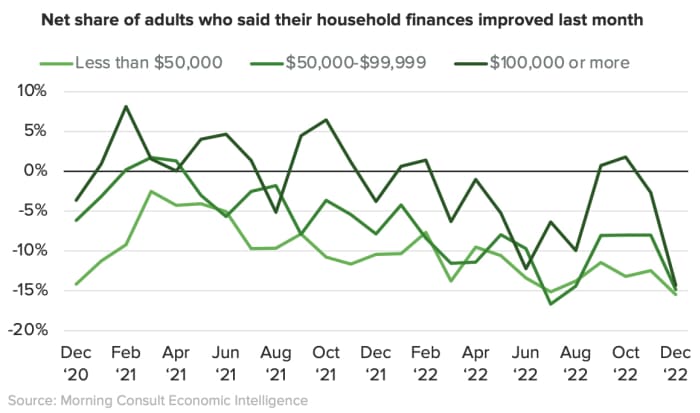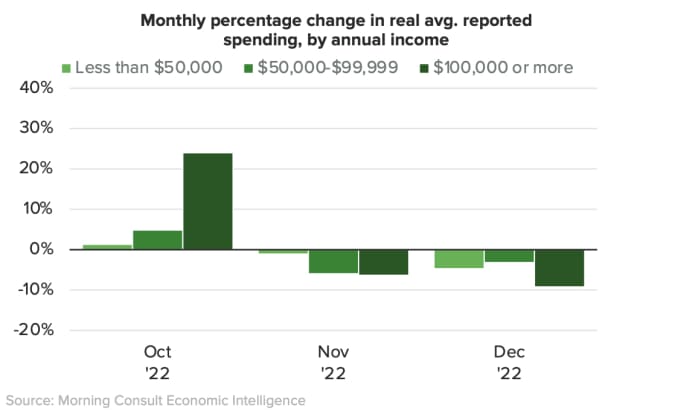[ad_1]
We want to hear from readers who have stories to share about the effects of increasing costs and a changing economy. If you’d like to share your experience, write to [email protected]. Please include your name and the best way to reach you. A reporter may be in touch.
Higher-earning households are feeling the inflationary pinch.
Consumer spending slowed and household finances weakened across all income levels last month. But households earning $100,000 a year or more reported shaving more off their spending than less well-off households did, according to a report released this week by Morning Consult, a decision intelligence company.
The report also found that real monthly spending among U.S. adults fell by 4.3% from November to December. Even so, 21.3% of U.S. adults said their monthly expenses exceeded their monthly income in December, up from 19.2% in November.
On average, households earning $100,000 a year or more said they spent about 10% less in real terms in December than they did the previous month. Households earning $50,000 to $99,999 and those earning less than $50,000 a year, meanwhile, reported that they cut their monthly spending bills by no more than 5% on average.
Across the board, households are cutting back on recreation, alcohol, vehicle insurance, and other services in December, while spending more on hotels, gas and airfares, the report found.

One theory on the spending cutbacks: Higher earners typically have more discretionary income, and likely have decided to exercise more fiscal caution after seven interest-rate hikes by the Federal Reserve last year. (On Wednesday, St. Louis Fed President James Bullard told The Wall Street Journal in a live-streamed interview that the Federal Reserve should not “stall” on raising its benchmark rates until they are above 5%.)
The Morning Consult report did cite inflationary pressures. “Heightened budgetary pressures brought on by persistently high inflation are forcing trade-offs for consumers, leading to reallocation across categories,” it said. “For instance, as food grew more expensive over the past year, U.S. households accommodated an increase in grocery purchases by spending less at restaurants.”
Earlier last year, higher-income households led consumer spending in the face of rising prices, said Kayla Bruun, an economic analyst with Morning Consult and co-author of the report. But household income, even for those earning six-figure incomes, has not been growing fast enough to keep up with inflation, she said.
“They probably started to realize, ‘Hey, I can’t keep buying the same basket of goods each month and expect to continue adding to my savings,’” Bruun told MarketWatch.

At the same time, recent layoffs in the higher-earning tech and financial sectors may also have affected sentiment among wealthier households, Bruun said.
The tech and financial sectors felt the impact of rising interest rates and economic headwinds, she added. Goldman Sachs
GS,
and BlackRock
BLK,
said earlier this month they were cutting jobs. Microsoft Corp.
MSFT,
confirmed plans on Wednesday to lay off some 10,000 workers, equivalent to around 5% of the company’s global workforce.
Before Microsoft’s announcement, data compiled by the Layoffs.fyi website estimated that more than 25,000 global tech-sector employees have been laid off in the first few weeks of 2023. Last year, approximately 60,000 people in the tech industry were laid off, according to Challenger, Gray & Christmas.
Still, there has been some good news: Inflation eased in December for the sixth consecutive month: The annual rate of inflation fell to 6.5% from 7.1% in November after reaching a four-decade-high of 9.1% last summer.
Also read:
Inflation hit rural, Hispanic, and Black people harder for one key reason
[ad_2]
Source link

